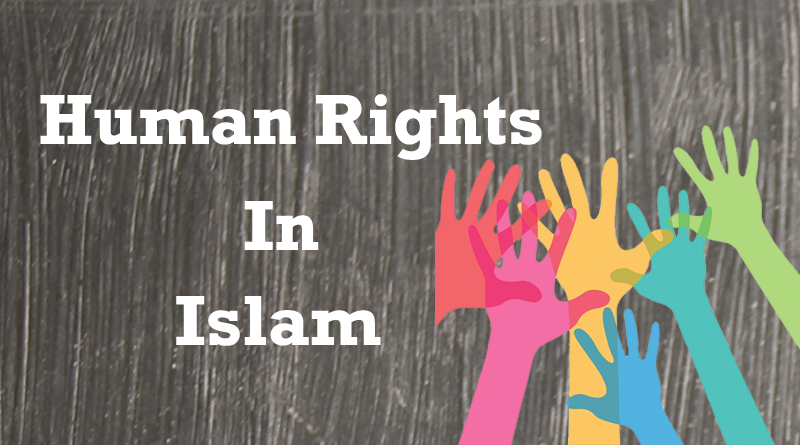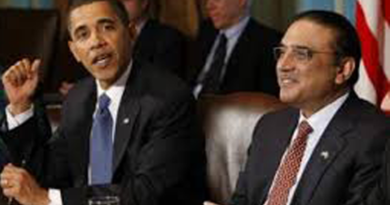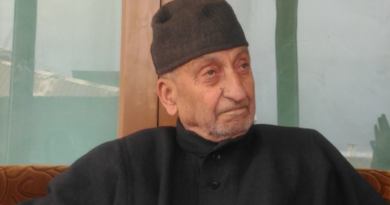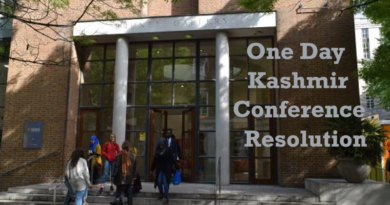How Islam Should Look at the debate of Human Rights
The human rights debate, as a matter of fact, has got firmly entrenched in the contemporary academic and political agenda. There are definite reasons for it, to which we shall come in a moment, but what has to be noted at the very outset is, since the issue of human rights has been brought up by the West which is presently the dominant civilisation, the attitudes towards this issue by the rest of humanity are likely to be largely determined by the standard rules of power: anything coming from the West comes from a power-position and as such evokes two types of responses, namely, Conformist—mere acceptance for the sake of it, or Rejectionist—mere rejection—- again for the sake of it, both of which speak of defeatist complexes and an inability to independently look at the reality of things.
The two attitudes mentioned above are found in the Muslim world as well. There are conformists—some very open and some not so. Those in the former category go to any extent to prove that Islam does not fall a millimetre short on the West’s human rights yardstick; all the rights West is talking about are already guaranteed in Islam. They become more enthusiastic when it comes particularly to the question of women’s rights. For example, they go on saying that the word ‘Hoor’ as mentioned in Quran, does not mean only the female companions for the believing men, but male companions for the believing women as well. Such examples can be multiplied with tremendous ease. In the latter category i.e. conformists, but not very open— there are those who join the debate, criticise some of the positions and ideas, but accept the basic premises. For example, they accept equality to be the core concept in rights—-equal rights to equal beings—- but differ with the West’s view of equality.
Rejectionist attitude is based on the thinking that whatever is from the West has necessarily to be rejected. This is not a reasonable position. Things have to be accepted or rejected on the basis of their intrinsic worth. Otherwise, how else can one understand the wisdom underlying a famous Hadith of Noble Prophet(PBUH), where he said that a believer must pick up the pearl of ‘Hikmah’(wisdom) from anyone who has it, even from a non-believer.
Hence, not adopting either of the two attitudes mentioned above, what we, should do instead, is to take an independent view of the whole matter. In the first place we should try to understand the reality of it, and then, decide how Islam should relate to it.
The Reality of Human Rights Agenda
As far as the reality of human rights agenda as promoted by the West is concerned, certain important things need to be noted:
(i) Western civilisation is an absolutely materialistic civilisation. As such, it does not have values in the real sense of the term, it decides its good and bad on the basis of its perceived self-interest. However, to be an acceptable way of life for the rest of humanity, and also for satisfying its own natural human instincts, the West has to have ‘values’. Human rights provides a facade for West’s ‘concern’ for values.
(ii) Human rights is a universal value-regime that the West is seeking to impose on the whole world. The use of human rights in the international policy, for example, linking it with trade, investment etc. etc. should be viewed as a part of West’s neo-colonial strategy of indirectly controlling the world by imposing universal regimes, economic, political etc. etc. Human Rights is a universal value regime, that gives the West freedom to interfere in areas where interference is not suitable or possible through economic or political regimes.
(iii) Apart from political reasons, the debate of human rights in west has a historical context as well as ideological basis. The latter can be traced back to Greek thought, whereas, the former is constituted by West’s own civilisational history. Human rights as a concept originated from Greek Naturalism—the laws and the values that were thought to be manifest in the universal nature. In the earlier phases i.e. before its politicisation, the ideological roots of Human rights were more visible than its historical context: human rights were considered synonymous with natural rights and there was more emphasis on duties rather than rights. With the secularisation of West, the whole debate of human rights seems to have been motivated by West’s historical experiences rather than any firm doctrinal inspiration. The American Declaration of Independence in 1776, and the French Declaration of the Rights of Man in 1789, both bear a clear testimony to this. Equality is the core concept in both the documents, and this is mainly to deny rights to certain privileges enjoyed by the nobility and clergy under the European monarchies. This inequality was treated as ‘arbitrary inequality—inequality not justified by the social well being or some other general or rational principle’.(1) Likewise it was the rise and fall of Nazi Germany, that brought home further realisations, and the idea of human rights “came truly into its own”. It was ‘realised’ that “human beings are entitled to simple respect at least”.(2)
(iv) The intellectual reason should be rather clear. Any civilisation that turns its back on the Divine guidance, has got to develop an alternate worldview—an understanding of the man, universe, their relation with each other etc. etc. No sensible human being, or a society can afford to live without some kind of understanding of their own selves and the reality around them. The concept of human rights is part of West’s secular worldview. It is interesting, but none of our jobs here, to see the mind-boggling problems that the secular intellectual had to face while theorising different concepts related to human rights. For example, the concept of equality has been the most tricky one: Fundamental equality has so far remained an axiomatic concept , its justification remaining “impossible”, and, therefore, in Karl Popper’s words it has remained a naked “decision”.(3) Because of this, animal liberationists like Peter Singer have advocated equal rights for animals as well, arguing that there is nothing special about human beings, and rights be extended to all sentient beings.(4)
Islam’s Role of Enlightening Human minds
Having taken the view of the present human rights debate, briefly sketched above in (i)-(iv), , let us see now, how Islam should relate to it. We start with the assertion that Islam has to address seriously, the issues brought up in the debate of human rights. This is because of Islam’s permanent role of enlightening human minds with the revelational paradigm of knowledge, call it Dawah or whatever. This enlightenment has to take place, as it has always, in a particular intellectual context. However, the terms of reference, the basic premises, the fundamental issues involved in the debate—-these things should be decided by Islam. For example, instead of coming up with the theories of Equality in Islam, one should see whether, in an Islamic framework of human rights, Equality is the core issue or not? Islam will speak from its own position, but taking into consideration the context created by West-initiated debate of human rights. There are ample instances in Quran where some important issues have been discussed with reference to the existing intellectual environment at that time.(5) in fact some episodes like those of ‘The People of the Cave’ and ‘Zulqarnain’ are answers to the queries of non-Muslims at that time.(6)
In the contemporary intellectual environment, the Muslim intellectual has to speak from the position of authentic Islam, knowing fully well that his task is not to please or, for that matter, displease the West, but essentially to inform and enlighten the human minds with the revelational paradigm of knowledge.
The most basic thing, he should do is to hit at the very underlying principle of human rights, which is the supremacy of human being in the realm of being and existence. The secular worldview, treating man as the most advanced mammal, believes that he is entitled to unlimited freedom, and his pleasure is the highest good. Any kind of ‘fetters’ on human ‘freedom’ be it the hijab of women or an undemocratic regime, is regarded as violative of human rights, and, hence, oppression. Here, the primary concern of the Muslim intellectual is not to uphold hijab,(on the basis that it is not a fetter), and denounce the undemocratic regime(on the basis that it really is), but to assert the primacy of Divine rights over the human. The greatest of oppression is Shirk(7), and shirk is nothing but violation of Divine rights. It makes absolutely no sense to talk of human rights, independently of, and ignoring Divine rights. In Islam human rights will make any sense only, when they are looked at as the ‘rights of the best of the creations of The Creator, Allah(SWT) i.e. the Man’. It is only then that human freedom gets its true meaning and becomes something that must not be violated. In the worldview of Divine supremacy, the most basic human right becomes one’s right to worship Allah alone and resist anyone else’s servitude; to manage his individual and collective affairs according to His laws, and to be free to live and die for Him. Islam is the deen of Monotheism, and Quran says that man’s nature has been created on this creed of monotheism.(8) If humanity is denied the right of living under monotheistic creed, laws and institutions, it will amount to its annihilation. Murder is the severest crime in Islam, because killing a single man is to kill the whole humanity, but, as Quran says ‘fitnah’ i.e mischief is more severe than murder, and to put an end to fitnah, killing is allowed. Why? Because fitnah in the meaning of polytheism and disbelief (the meaning in which it has been used in the Quranic verse 2:195), aims at denying the monotheistic way of life to human beings—their most basic right—, it becomes more severe than killing: “killing only terminates the life of this world while infidelity terminates this life as well as the next one and destroys both worlds”.(9) Right to worship Allah(SWT), to lead a life under His and His command only is so basic that to defend this right even killing is allowed, which otherwise is a heinous crime because it impinges on the right to life. The Muslim intellectual has to insist on the principle of the supremacy of The Divine as opposed to human in all worlds, spaces—conceivable and inconceivable , meta-physical and physical—- and then talk of rights as the rights of the creation, the creation of the most merciful and beneficent God. The talk of rights will then have any meaning and content Not to talk of human rights proponents, the Muslim intellectual may find a lot of common ground with animal rights proponents even, as far as the individual rights like for example, right to express ones convictions, right to an honourable life, right to compassionate slaughter for animals, are concerned.
Historical Situation of the Muslim Ummah
Apart from, what I call ‘enlightenment of human minds’ above, there is one more thing that makes the present human rights agenda relevant for Islam, and this is the historical situation of the Muslim ummah. The major part of the ummah is living under tyrannical regimes, and here in the secular world we have laws and a network of institutions that apparently uphold and protect so many individual freedoms and liberties totally denied by these ‘Muslim’ regimes. In this situation what generally happens is that we articulate our grievances in terms of human rights as understood from the West, and also seek the remedy of our ills in these systems of rights and equality. The disease i.e. the tyrannical regimes ruling the Muslim world, in the first place is unfortunate, but so is the response to it and the remedy sought. The human rights system of the West cannot rectify our historical situation, but it definitely gives us an impetus to take stock of our situation and do something about it. An original ‘theory’ of human rights seems to be much called for. Islamic faith is creative of a social order, and, therefore, Islamic teachings must contain a full account of the rights and duties—- the twin bond holding the society together. However the need of proper codification is always there. It is like political thought, which although being part and parcel of Quran and the Sunnah, was, however, not codified as an autonomous discipline; most of its basic elements forming a part of fiqh i.e. jurisprudence. (see Hamid Enayat) Same is the case with Rights.
The Core Concept
The basic thing that has to be decided while formulating an Islamic theory of rights, is the wider conceptual domain within which this theory can be attempted. For example, is Freedom the core concept from which the theory can be derived? In the West’s formulation it is, and also some Muslim intellectuals tend to think this way. They emphasise the freedom ,both, inborn and acquired, that God guarantees to man in Quran. I do not agree with Freedom to be the core concept. In the Islamic worldview servitude to Allah(SWT) and accordingly to His do’s and don’ts overrides the freedom. Ibadah(worship) is the ultimate aim for which freedom is a prerequisite. The West’s view of Freedom is basically rooted in secularism. That is why the individual freedom vis-a-vis the Divine is substantial, whereas, vis-a-vis the state is ultimately cosmetic.
Justice, some Muslim intellectuals believe, underlies the concept of rights. I agree with this. Justice is the most central notion in Islam. However, the concept of Justice in Islam needs to be understood first, in its original sense. Implementation of Sharia, if it means just cutting of hands, flogging, and differences in the legal status of men and women, will not make Islam attractive to the bulk of humanity who generally tend to look at the issues of justice from a liberal view point. We should not, nor we can, change the laws of the noble Sharia, but what is sorely needed, is development of Islamic ethical theories and political philosophies that could provide an overall framework within which the laws and commandments of Sharia could then be implemented and viewed by others. The cornerstone of Islamic politics and political theory is Justice, and what we need to introduce to the world at large is the Islamic concept of justice. Rights and particularly social rights will form a part of it. We cannot do the other way round: formulating a system of rights on the basis of the concepts of equality, freedom and liberty and then defining justice in terms of this system. Quran establishes the fundamental equality of all mankind, but that does not automatically translate into social equality. A Muslim and a non-Muslim do not have equal rights, nor do a man and woman or a free man and a slave man. There is, however, no distinction on the basis of race.(10) Now if we define justice in terms of the concepts like equality, we may have to either come up with the conclusion that justice in Islam is flawed, or, alternatively, we may try to interpret Quranic verses in a way that inequalities are ‘removed’, as do some Muslim reformist thinkers. Needless to say, both these approaches are wrong. Instead, what we have to understand is, that the concept of justice is a core concept in Islam, it is as central to Islam as, for example, prophethood, and as such it has to be understood from the primary sources of Islam. Once it is understood from the original sources, the wisdom behind the apparent inequalities will automatically unfold before us. As has been argued by some Muslim thinkers, “the conception of justice in Islam is not completely egalitarian” although “important elements of egalitarianism” do exist in the concept itself. Furthermore, “the ideal of the application of Islamic law is strictly egalitarian. The law itself is also largely egalitarian, with exceptions based on religion and gender.”(11) The truth of the matter is that human society, social relations, rights and social justice are so complex areas that human mind, simply, cannot grasp the complexities let alone devise systems and methods to overcome them. There is clear evidence from Quran that in the beginning human beings had social bonds with each other, but that was a matter of instinct As the celebrated Quranic commentator the late Allama Tabatabai says “It was the institution of prophethood which made the man aware of society and social bonds in detail and exhorted him to preserve and protect it as a distinct factor of humanity.”(12 )Unfortunately for the whole humanity, and Muslims in particular, the social mission of prophets—the overwhelming dimension of their overall mission—has not received attention it should have. But Quran is very explicit on this. For example, Quran says that prophets were sent with book and balance to establish justice among men.(13) This means that although man with his human faculties of intellect and reason is capable of conquering the space, sun and the moon, yet he is not able by himself to establish justice. This is something which prophets did on the basis of Divine Books, and taught the man how to do it. Why this is so is not difficult to understand: the imbalances and other social ills that the system of justice seeks to rectify are of man’s own making; social conflict is the creation of human nature. If human nature is the cause of problem it cannot be the cure. There is a very clear verse in Quran which says that the conflict that arose in human society was resolved by prophets on the basis of Divine Guidance. The verse reads: Mankind was but one people; so Allah (SWT) sent the prophets as bearers of good tidings and as warners, and He sent down with them the book with the truth, so that it might judge between the people in that in which they had differed. And none differed about it but the very people who were given it, after clear signs had come to them, revolting among themselves; whereupon Allah guided , by His will, those who believed to the truth about which they differed. And Allah guides whom He pleases to the straight path.”(2:213) Allama Tabatabai while explaining the verse says “It is clear that there were two differences: First, the difference about worldly gains, which was but natural; second, the difference about the matters of religion, which was based not on nature, but on the revolt of mischief-makers…”Allama after a very detailed discussion of the issues involved in this verse sums up the factors on which rests the reason for which Allah (SWT) initiated the prophetic mission in the first place. These factors are:
- Human nature leads man to social co-operation;
- At the same time it creates friction and conflict;
- Nature itself cannot remove that conflict;
- Therefore, a force outside of nature, should intervene to remove that conflict;
- Allah completes creation and in His mercy, has taken it upon Himself to guide everything to its perfection;
- As a result of that undertaking, He sent prophets and revealed to them the book to reform the human society.(14)
So what emerges from the above discussion is that our historical situation, howsoever bad it may be, cannot be rectified by implantation of West’s human rights. It will create further conflicts in our society, as it has, where such attempts have been made. In fact, the present human rights agenda is not going to solve any of the problems of the West itself. However, as mentioned above, the tyrannical regimes in Muslim lands on the one hand and regimes of relatively far more freedom and liberty in the secular West must constitute a reason for Muslim thinkers and intellectuals to initiate serious efforts for developing ethical theories and political philosophies, that could form the intellectual foundation for a thorough overhaul of our societies. As argued above, the concept of Justice should form the core concept here, and we must understand this concept from the original and primary sources of Islam i.e Quran and the Hadith. I will conclude by quoting here a passage from Dr Muhammad Legenhausen’s article on Rights, which seems to be very relevant:
The core concept underlying justice in Islam is not equality, fairness or impartiality, but order. Justice consists of everything being in it proper place, so that the community becomes a harmonious organic unity. This harmony requires fairness, impartiality and equality to a certain extent, but women and men must have different rights and duties in accordance with the different roles they play in the society. Hence Justice in Islam is based on a vision of harmonious society under God, the details of whose social relations are indicated in Quran and Hadith. How this ideal is to be approached from the position in which Muslim societies currently find themselves will require institutional arrangements which may go beyond anything explicitly mentioned in the Quran and hadiths, but the notion of justice on which these institutions are to be based is that described in the Quran and hadiths rather than in social contract theories.
_____________________________________________________________________________________
References:
- See “Islam and Western Theories of Equal Rights” by Dr Mohammad Legenhausen in Hikmat 1:2 p201
- See “Human Rights” In Encyclopeadia Brittanica. Macropeadia 20 p657. 15th edition 1997
- See “Equality” by Brian Barry in Encyclopeadia of Ethics by Lawrence Becker(ed). pp 324-5.
- See Islam and Western Theories…. P202
- See the noble Quran, for example, 45:24-26
- Quran Ch 18
- Quran 31:13
- Quran 30:30
- Al-Mizan by Allama Syed M H Tabatabai. Vol 3, p88. Tehran:WOFIS.
- See “Islam and Western Theories……”p 211
- Ibid p 213
- Al-Mizan vol 7 p146
- Quran 57:25
- Al-Mizan vol 3 p168,193
***
Dr. Syed M Inayatullah Andrabi is a well-known figure in the circles of political Islam. Born in Srinagar, the capital city of Indian Held Kashmir, Dr Andrabi has been intimately involved at the intellectual level with the global politics and political issues since his student days in 1980 at Pune (India), where he completed his Ph.D. in Linguistics in 1983 at the Centre of Advanced Study in Linguistics, Deccan College, University of Pune, Pune, India. Upon completing his doctorate he returned home to join the University of Kashmir, first on a post-doctoral fellowship and later as faculty, but could not continue because of the deteriorating security situation in Kashmir, and had to move to United Kingdom in 1994 where he continues to live since along with his wife and five children.




